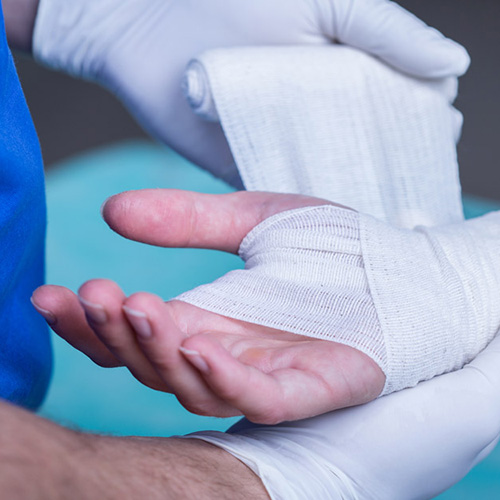How to become a wound care nurse
Becoming a wound care nurse is an exciting and rewarding career path for nurses who are passionate about providing specialized care to patients with acute and chronic wounds. Wound care nurses play a pivotal part in assessing, treating, and managing various wound types, including pressure injuries, surgical wounds, and diabetic wounds. Let’s review how to become a wound care nurse, the time it takes to achieve this goal, the most common wound care certifications, and where to find those certifications.
To become a wound care nurse, individuals must first obtain a nursing degree or vocational nurse diploma program and become a registered nurse (RN), licensed practical nurse (LPN), or licensed vocational nurse (LVN). This typically involves completing an accredited nursing program, such as an Associate Degree in Nursing (ADN) or a Bachelor of Science in Nursing (BSN) program. Once individuals have obtained their nursing degree, they must pass the National Council Licensure Examination (NCLEX-RN for RNs or NCLEX-PN for LPNs/LVNs) to become licensed to practice as a nurse.
After becoming a licensed nurse, individuals can pursue specialized training and certification to become a wound care nurse. This often involves completing additional education and training in wound assessment, treatment, healing, infection control, and standards of care.

How long it takes to become a wound care nurse
The time it takes to become a wound care nurse can vary depending on an individual's starting point and their career goals. Here are the general steps and time frames for becoming a wound care nurse:
- Nursing education: Completing a nursing program to become an RN typically takes between two and four years, depending on the type of program (ADN or BSN) and whether the individual is pursuing full-time or part-time studies. An LPN/LVN program typically takes at least one year.
- Licensing: After completing their nursing program, individuals must pass the NCLEX-RN or NCLEX-PN to become licensed as a nurse. This generally requires additional study and preparation, followed by the exam itself.
- Specialized training: After receiving their nursing license, individuals can pursue specialized training and certification in wound care. The time it takes to complete this training can vary depending on the specific certification program and the individual's availability to study and attend training sessions.
The overall process of becoming a wound care nurse can take anywhere from three to six years, depending on the individual's starting point and their chosen career path.
To learn more about the responsibilities and duties of a wound care nurse, read our in depth Wound Care Nurse Duties blog.
Common certifications for wound care nurses
Nurses can benefit from obtaining specialized certifications that demonstrate their expertise and commitment to providing high-quality care to wound care patients. Some of the common certifications for wound care nurses include:
Wound Care Certified (WCC): Offered by the National Alliance of Wound Care and Ostomy (NAWCO), the WCC certification is designed for healthcare professionals, including RNs and LPNs/LVNs, who want to specialize in wound care. The certification covers wound assessment, treatment, pressure injury prevention, and ostomy care.
Certified Wound Ostomy Continence Nurse (CWOCN): This certification, offered by the Wound, Ostomy, and Continence Nursing Certification Board (WOCNCB), is designed for nurses who specialize in wound, ostomy, and continence care. It covers a wide range of topics related to wound, ostomy, and continence management.
Certified Wound Care Nurse (CWCN): The CWCN certification, also offered by the WOCNCB, is for nurses specializing in wound care. It covers wound assessment, treatment, and the management of various wound types.
Where to find wound care certifications
Wound care nurses can find certification programs and training courses through various accredited organizations and institutions. Some valuable sources for wound care certification include:
- Wound Care Education Institute (WCEI): While WCEI doesn’t administer the wound care certification examinations, WCEI offers review courses and educational resources for healthcare professionals, like RNs and LPNs/LVNs, who want to specialize in wound care or ostomy care. Offering Skin and Wound Management, Diabetic Wound Management, and Ostomy Management courses, WCEI’s courses are available in both in-person and online formats, providing flexibility and convenience.
- National Alliance of Wound Care and Ostomy (NAWCO): NAWCO offers the Wound Care Certified (WCC) program, which is designed for healthcare professionals, including RNs and LPNs/LVNs, who want to specialize in wound care. Covering a range of topics related to skin and wound management, this certification shows a nurse’s expertise and knowledge of wound care fundamentals.
- Wound, Ostomy, and Continence Nursing Certification Board (WOCNCB): WOCNCB offers several certifications for nurses specializing in wound, ostomy, and continence care, including the CWOCN, WTA, and CWCN certifications. These certifications are widely recognized and respected within the healthcare industry.
- American Board of Wound Management (ABWM): ABWM offers the Certified Wound Care Associate (CWCA) and Certified Wound Specialist (CWS) certifications. The CWCA and CWS certifications cover a broad range of wound care topics, providing RNs and LPNs/LVNs with a solid foundation in wound care principles and practices.
Wound care is a high-demand specialty that can present different career opportunities, including leadership and entrepreneurial positions. By pursuing wound care certification, you can not only enhance your knowledge and skills in a critical area of healthcare, but you improve care outcomes and quality of life for your patients.
Want to jump start your wound care career?
WCEI offers accredited courses for Skin & Wound Management, Diabetic Wound Care, Ostomy Management, and more. Prepare for the credentialing exam with our online, live online, onsite, & recertification course options.